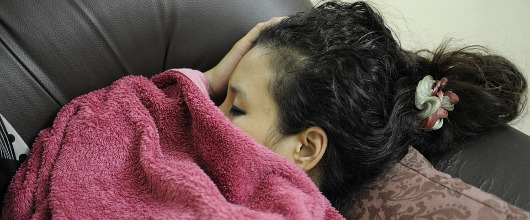Want to appear more intelligent? Get more sleep

A new study from the University of St Andrews has found that getting more sleep may help individuals appear more intelligent to their teachers and prospective employers by influencing their neutral expression.
The research, published in the Journal of Experimental Psychology: General, sheds light on how people may change their perceived intelligence regardless of their attractiveness, and it appears the answer lies in the neutral facial expression.
Lead author Sean Talamas, a post-doc researcher in the School of Psychology and Neurosciences’ Perception Laboratory, explained:
“The infamous ‘attractiveness halo’ is when positive attributes are preferentially ascribed to attractive people over unattractive people. Attractive people are often perceived as more intelligent, but we wanted to investigate how individuals can change their perceived intelligence, regardless of their attractiveness. The solution seems to lie in subtle differences in a resting facial expression that are related to sleep – namely eyelid droopiness and subtle frowning.”
Using special face-processing software, the team of researchers were able to measure the degree of eyelid openness and mouth curvature of 190 faces (children and adults), who were photographed with a ‘neutral expression’. Over 200 evaluators were then asked to rate the attractiveness and intelligence of the faces – the results show that those faces with a subtle frown and droopy eyes were perceived as less intelligent.
Dr Talamas continues: “People over generalise in judging those with droopy eyelids and a frown as being tired and having a low mood, both of which have a well-documented detrimental effect on cognitive performance. Therefore it should be no surprise that many of us find people who look less alert and who have a lower mood as less intelligent looking.”
In collaboration with researchers in the Karolinska Institutet in Sweden, photographs were also taken of the same participants after a full night’s sleep and after a night of restricted sleep. When the same individuals had less eyelid-openness and a subtle frown it resulted in a significant decrease in their perceived intelligence.
David Perrett who runs the Perception Lab commented that “recent scientific advances show how subtle expressions affect judgments but our work is new in demonstrating the impact of apparent tiredness on social judgments. Sleep is not just important for performance but it also affects how others see us”.
Dr Talamas concludes: “The take home message? In an interview with an employer or the front row of a classroom, being cautious of your resting facial expression and getting more sleep may help you look more intelligent. For those on the other side of the issue – someone who looks disinterested, unengaged or tired may be just as intelligent but less aware of the impact of their resting expression.”
Dr Talamas was also the lead author on another published study in Personality and Individual Differences this week which found that individuals who scored higher on intelligence tests were more likely to rate a child’s face they perceived as intelligent as also being attractive. This finding emphasizes that individuals differ in their susceptibility to the attractiveness halo and paves the way for future research to investigate how to target and overcome such bias.
Notes to editors:
Sean Talamas recently gave a TEDx talk, which discusses his findings further. Follow the Perception Lab on Facebook.
The full research paper is available to view online.
Issued by the University of St Andrews Communications Office. Contact Victoria Herd, Communications Coordinator, on 01334 462530 or email [email protected]
Reference: rbf0316
Category Research